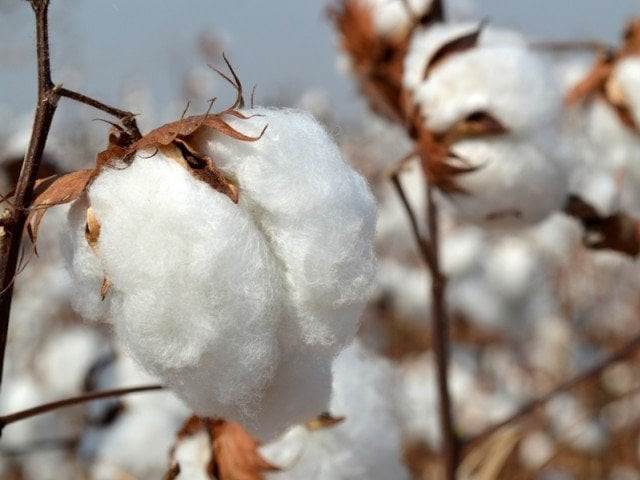Traders oppose sales tax on raw cotton
Say it will discourage production, counter govt’s policy of boosting cotton trade

PHOTO: FILE
In a statement, the Karachi Cotton Association (KCA) rejected the proposal of imposing sales tax on raw cotton, saying it would discourage production, prevent a smooth flow of exports and counter the government’s policy of promoting cotton trade in the country.
It was of the view that any hurdle in the way of smooth cotton exports would also prevent growers from getting a fair price for their produce, which was a key objective of the government.
In the 2018 season, Pakistan produced 10.8 million bales of cotton against the target of 14.3 million bales. This time, the government has set the target at 15 million bales.
Textile industry likely to get higher import orders from US
“According to the Punjab minister for agriculture, the province will produce eight million bales in fiscal year 2019-20. Sindh produces four million bales, therefore, this adds up to 12.2 million and the government can expect 12.25 million bales in the best case scenario,” remarked Naseem Usman, a KCA member, while talking to The Express Tribune.
“I don’t understand how the government has set the target of 15 million bales,” wondered Usman. “The Senate standing committee has gone further, projecting production of 15.2 million bales. It seems they come up with estimates without taking ground realities into account.”
“The textile sector is misusing the zero-rated status as more than 50% of its sales are domestic, which is why the government has announced that it will refund the tax to those who export and withdraw the exemption from those who do not export,” said Syed Mahmood Nawaz Shah, a member of the Sindh Abadgar Board.
“The government, businessmen and farmers need to work together to improve cotton production as the country imports four million bales,” he said.
Official calls for improving textile export industry
The government should approach the growers to help increase crop yield and crop quality in order to save foreign exchange, which was being spent on cotton import, said the KCA member.
Compared to the maximum production of 14 million bales that Pakistan once touched, the country fell short of the target by 30-35% last year and the situation did not look promising in coming years, said Shah.
“So far, the condition of new crop is good, but the crop is attacked by pests as our cotton varieties are old and not immune to insects,” he said.
In the decade of 2001-10, Pakistan brought in Bt cotton, which is a genetically-modified pest-resistant cotton variety. However, now the pests have become powerful against the new variety as well and this kind of cotton also gets harmed by pink bollworm.
Initially, this form of cotton was pest-resistant and more productive, due to which Pakistan saw a revolution, taking cotton production from 8-9 million bales to 14.8 million bales, said Shah. “In less than 10 years, we touched 14.8 million bales but the output has now declined to 10-11 million bales,” he said.
Being one of the largest cotton growers in the world, Pakistan exported the crop as well but it had to import long staple cotton, which was demanded by the value-added textile sector, said the Sindh Abadgar Board member.
“Pakistan can get higher production with the same cultivated area if the government provides incentives and pesticide-resistant seed varieties,” he said. “We do not have any research and development work in seed production due to which Pakistan does not have any new seed varieties.”
For the high value-added textile industry, he said, Pakistan needed long staple cotton, which could be produced if the growers were provided new seed varieties.
Cotton consumes three times less water compared to rice and sugarcane crops, so Pakistan, which is a water-scarce country, can take benefit of it. “Pakistan should try to replace high water-consuming crops with low water-consuming crops,” he added.
Published in The Express Tribune, June 21st, 2019.
Like Business on Facebook, follow @TribuneBiz on Twitter to stay informed and join in the conversation.



















COMMENTS
Comments are moderated and generally will be posted if they are on-topic and not abusive.
For more information, please see our Comments FAQ